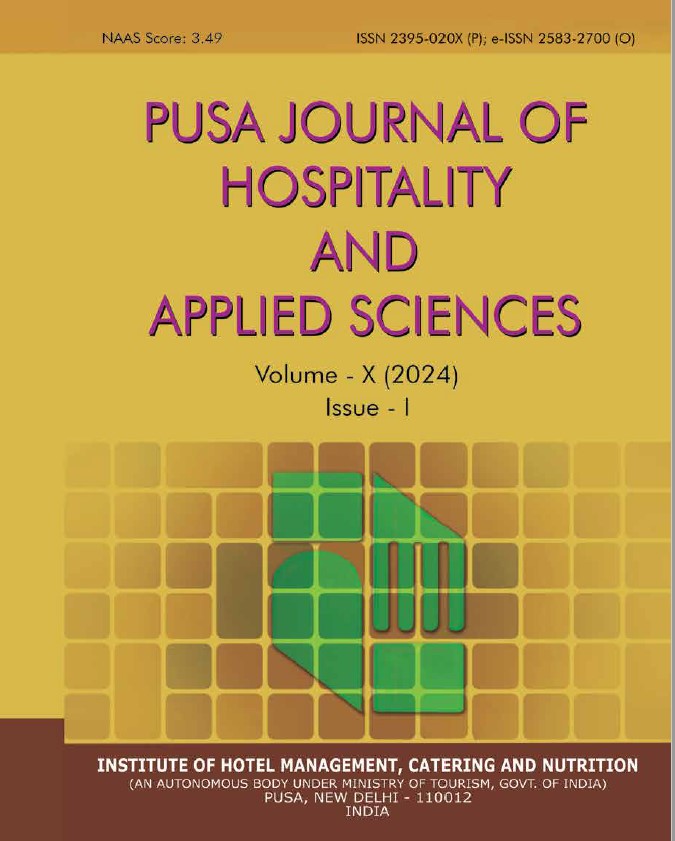Guest Preferences And Future Challenges In The Post Covid-19 Scenario- An Exploratory Study Of Hotel Front Office Department
DOI:
https://doi.org/10.48165/pjhas.2023.9.1.6Keywords:
NCR, Hotel, Guest Satisfaction, Accommodation Industry, Post- COVID, Adaptive Practices, Guest Satisfaction Guest Preferences, Safety Measures, Sustainability, TechnologyAbstract
Background:The hospitality industry is recovering, evolving, and adapting itself in the post COVID-19 era through innovative and sustainable practices backed by the use of technology in entire hotel operations. The hotel Front Office department is no exception in utilizing these evolved practices to understand and influence the customer behaviour while exploring all possible measures to enhance the overall guest stay experience in the post- COVIDtimes. The Front Office department plays a vital role in the passage of accurate and timely information required for flawless guest management in the hotels. Throughout the COVID-19 period, the Front Office practices have evolved through different stages depending upon the factors such as guest preferences, safety and security measures, hygienic conditions, sustainability and use of technology. Objectives: The major objectives are to study the post COVID-19 Hotel guest preferences of non-star category hotels with respect to changing scenario in the Hospitality Industry, to analyse the gaps between hotel guest expectations and perceptions in service quality with special mention of the front office department and to highlight the future challenges faced by hotel industry and suggest possible measured to overcome these challenges. Methodology: Hybrid research approach has been adopted in this study. Grounded theory in qualitative research approach with interview and semi-structured questionnaires are the data collection tools. Survey method with structured questionnaire are quantitative data collection tools. Collected data were analysed through content and thematic tools for qualitative data and quantitative data were analysed through descriptive statistics (Mean, SD, percentage) and paired t-test as an inferential statistical tool has been applied in this study for conclusion purpose. Results: Result indicates negative as Expected value – perceived value = - (negative). Conclusion: It is concluded that hotel-guests' are not satisfied as provided facilities are not as per guests' expectation. This study gives overview of guests' expectation. It helps hoteliers for modification of hotel's facilities for the guest. The limitation of the study is that the study is conducted in NCR only. Hotels of the same category in the other cities/town may be conducted for getting actual scenario of the phenomena of the hotels. In addition, the study proposes that hotels should adjust their room and service pricing to reflect the reduced demand during the COVID era. Furthermore, the hotel industry will face ongoing challenges, and hotels must be adaptable to remain competitive. By embracing new technologies, providing distinctive experiences, and implementing sustainable practices, hotels can overcome these challenges and flourish in the years ahead.
References
Batinić, I. (2014). Training And Development Standards For Front Office Employees In Modern Hotel Industry Journal of Process Management – New Technologies, International, 2(4),69-73.
Gerwe, O. (2021). The Covid-19 pandemic and the accommodation sharing sector: Effects and Prospects for recovery Technological Forecasting & Social Change, 167 (8), 120733.
Gumaste, R., Bhagwat, R., &Thakkar, P. (2015). A Study on Hotel Front Office Practices and Its Impact on Guest Satisfaction with Reference to the Vivanta by Taj Blue Diamond, Pune. ATITHYAAJournal of Hospitality, 1(2).
Hospitality Industry: All your questions answered." Ibis W o r l d . A c c e s s e d D e c e m b e r 2 , 2 0 2 1 . https://www.ibisworld.com/industry-insider/industry insights/hospitality-industry-all-your-questions answered/.
Indian Hospitality Trends and Opportunities- 2021 h t t p s : / / h o t e l i v a t e . c o m / w p - content/uploads/2021/09/Hotelivate_TO_2021.pdf
Jones, P., & Lockwood, A. (2004). The Management of Hotel Operations. Cornwall: Thomson
Khanna, A., &Chalishazar, M. (2022, August 23). The 2022 Indian Hospitality Trends & Opportunities Report. Market Snapshots, Strategic Advisory, Travel & Tourism.
Kumar, S. R., & Vetrivel, T. (2015). Customer Perceptions on Service Quality of Front Office Staff at Hotel, International Journal of Scientific Research, 4(7)|, 227 – 230.
Oaten, S., Le Quesne, K., & Segal, H. (2015). Adapting to Uncertainty—The Global Hotel Industry. World E c o n o m i c Fo r u m . G e n e v a . Av a il a b l e a t https://www.weforum.org/reports/adapting-to
uncertainty-the-global-hotel-industry.
Palmer, A. (2020). Travel and Tourism. In A New World Post COVID-19. DOI: 10.30687/978-88-6969-442- 4/027.
Parasuraman, A, Zeithaml, V. A. and Berry, L. L. (1991). “Refinement and Reassessment of the SERVQUAL Scale”, Journal of Retailing, 67, 420-450.
Parasuraman. A., Zeithaml, V. A., & Berry, L.L. (1985 & 1988). A conceptual model of service quality and its implication. Journal of Marketing, 9, 41-50.
Sigala, M. (2020). Tourism and COVID-19: Impacts and implications for advancing and resetting industry and research. Journal of Business Research, 117, 312-321.
Srivastava, N., and Maitra, R. (2016). Key Performance Indicators (KPI) in Hospitality Industry: An Emphasis on Accommodation Business of 5 Star Hotels of National Capital Region. International Journal of Research in Tourism and Hospitality, 2 (1), 34-40.
Sujit, A. S. Gokilavani, Antony, N., & Sankar, U. (2022). Paradigm Shift in Marketing Strategies of Hotel Industry in Bengaluru, Post Covid-Customer Perspective, ICBT 2022 pp1275-82.
Toh, R. A. M., & Potapova, I. I. 2013. Check-in check-out: Improving the operations of Hotel Front Office operations European Journal of Economic Studies, 4(2), 115-117.
Varma, S., & Patole, A. (2013). Foreign Language Proficiency of The Front Office Staff W.R.T. Luxury Hotels In Mumbai – A Managerial Perspective, International Journal of Business Management & Research (IJBMR), 3(4), 1-8.
Zeithaml, V. A., Parasuraman, A., & Berry, L. L. (1990). Delivering quality service: balancing customer perceptions and expectations. New Jersey: Free Press.
The 2021 Skift and Oracle “Back to Hospitality” Report :https://www.oracle.com/a/ocom/docs/industries/hospita lity/skift-oracle-back-to-hospitality.pdf




